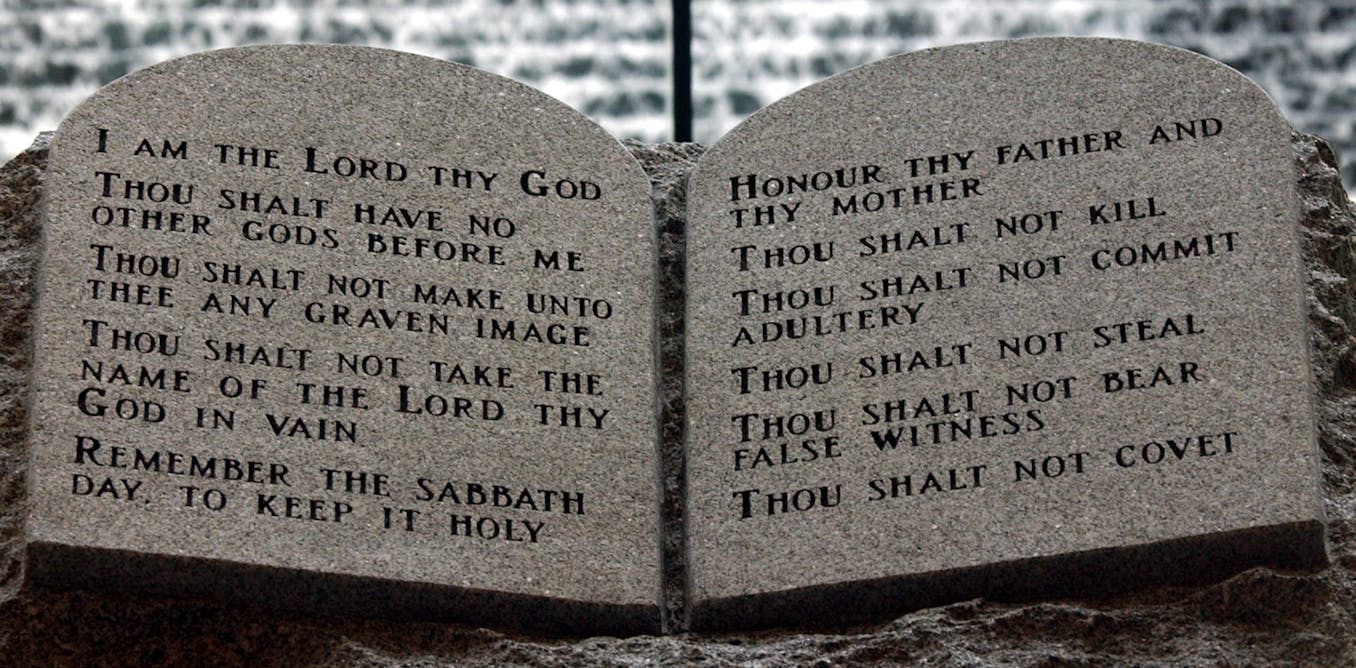Louisiana is not a stranger to controversy above religion in educational facilities. In 2023, it joined almost 20 states that involve or let officers in public educational facilities to put up the nationwide motto, “In God We Have confidence in.”
Now, the Bayou State has turn out to be the first in the country to call for the submitting of the 10 Commandments in school rooms in general public universities, schools and universities.
Gov. Jeff Landry signed Home Bill 71 into legislation on June 19, 2024, requiring officers in general public universities, which includes colleges and universities, to post a precise model of the 10 Commandments. The text is similar to the King James translation of the Bible used in a lot of Protestant church buildings.
Officers must post a context statement highlighting the position of the Ten Commandments in American history and could also show the Pilgrims’ Mayflower Compact, the Declaration of Independence and the Northwest Ordinance of 1787, a federal enactment to settle the frontier – and the earliest congressional doc encouraging the development of educational institutions.
One of the bill’s supporters, state Sen. J. Adam Bass, defended it on the grounds that its “purpose is not exclusively religious.” He advised fellow lawmakers that the Ten Commandments are critical because of their “historical importance, which is basically just one of lots of files that display the record of our state and foundation of our legal method.”
As somebody who teaches and researches law all-around faith and schooling, I imagine the regulation is problematic. It is likely to invite litigation at a time when the Supreme Court’s wondering on faith and point out is shifting.
How SCOTUS has dominated in advance of
Litigation over the Ten Commandments is not new. Extra than 40 decades ago, in Stone v. Graham, the Supreme Court turned down a Kentucky statute that mandated shows of the 10 Commandments in school rooms.
The court docket reasoned that the underlying legislation violated the Initially Amendment’s institution clause – “Congress shall make no legislation respecting an institution of religion” – for the reason that the mandate lacked a secular objective.
The justices were not persuaded by a tiny notation on posters that explained the 10 Commandments as the “fundamental authorized code of Western Civilization and the Popular Legislation of the United States.”
20-five several years later on, the Supreme Courtroom once more took up situations demanding community shows of the Ten Commandments, although not in universities. This time, the justices attained mixed outcomes.
The initially arose in Kentucky, exactly where officers had erected a county courthouse show about texts including the Ten Commandments, the Magna Carta, the Declaration of Independence and a biblical citation. In a 2005 ruling in McCreary County, Kentucky v. American Civil Liberties Union of Kentucky, the five-individual the greater part agreed that show of the Ten Commandments violated the institution clause, mainly because it lacked a secular legislative intent.
On the identical day, on the other hand, the Supreme Court docket reached the opposite consequence in Van Orden v. Perry, a case from Texas. The court upheld the constitutionality of a screen of the 10 Commandments on the grounds of the condition capitol as one of 17 monuments and 21 historic markers commemorating Texas’ heritage.
In contrast to the pretty new display screen in Kentucky, the one particular in Texas, which had existed considering the fact that the early 1960s, was erected making use of private funds. The court docket permitted the 10 Commandments to keep on being mainly because, in spite of their spiritual significance, the monument was a far more passive show than in Stone: unfold out across 22 acres, somewhat than posted on the courthouse doorway.
AP Photograph/Harry Cabluck
Louisiana’s legislation
Louisiana’s legislation requires community faculty officers to show framed copies of the Ten Commandments in all community school school rooms. Posters need to be at the very least 11-by-14 inches and be printed with a big, easily readable font. The legislation allows, but does not need, officers to use condition money to invest in these posters. Shows can also be obtained as donations or ordered with gifted funds.
The bill’s creator, point out Rep. Dodie Horton, beforehand sponsored Louisiana’s legislation mandating that “In God We Trust” be posted in general public faculty lecture rooms.
In defending the 10 Commandments proposal, she claimed it honors the country’s spiritual origins.
“The Ten Commandments are the basis of all legislation in Louisiana,” she told fellow lawmakers, “and supplied all the junk our kids are exposed to in school rooms nowadays, it’s vital that we set the Ten Commandments again in a distinguished place.”
Justifying the bill, Horton pointed to Kennedy v. Bremerton Faculty District, a 2022 Supreme Courtroom choice. Listed here, the justices held that instructional officials could not reduce a football mentor from praying on the subject at the stop of games, for the reason that he engaged in personalized religious observance shielded by the First Modification.
“The landscape has transformed,” she mentioned.
New frontier
Without a doubt it has.
For a long time, the Supreme Court docket made use of a established of requirements often known as the Lemon v. Kurtzman take a look at to assess regardless of whether a governing administration action violated the establishment clause. Underneath this test, when a govt motion or plan intersects with faith, it had to satisfy 3 standards. A coverage experienced to have a secular legislative purpose its principal or major influence could not progress faith and it could not consequence in abnormal entanglement involving state and religious officers.
A different exam the Supreme Court in some cases applied, stemming from Lynch v. Donnelly in 1984, invalidated governmental steps showing up to endorse faith.
The bulk of the existing court docket, however, abandoned each the Lemon and endorsement exams. In the majority belief in Kennedy v. Bremerton, Justice Neil Gorsuch wrote that “the Establishment Clause must be interpreted by ‘reference to historical techniques and understandings.’” He included that the court docket “long back abandoned Lemon and its endorsement test offshoot.”
What that new conventional implies continues to be to be observed.
In my check out, the Louisiana law’s supporters’ reliance on Kennedy is mistaken. That decision upheld voluntary, non-public prayer, not mandated postings of religious statements, overlooking lots of students’ beliefs.
A lot more than 80 several years back, in West Virginia Condition Board of Schooling v. Barnette the Supreme Court docket decided in a 6-3 opinion that students can not be compelled to take part in saluting the American flag, like the text “under God” in the Pledge of Allegiance, if doing so goes in opposition to their religious beliefs.
Beneath Louisiana’s new legislation, learners want not recite the Ten Commandments. Nevertheless, supplied their distinctly religious concept, I think Dwelling Monthly bill 71 faces a doubtful long run.
This write-up was up-to-date on June 19, 2024 right after Louisiana’s governor signed Residence Bill 71 into regulation.




